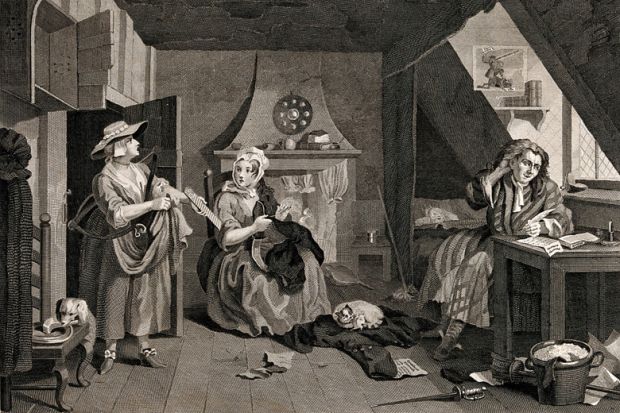Handel’s Water Music is performed on musical glasses; a dinner party of stutterers, brought together as a practical joke, turns into a brawl of mutually offended guests; and a poem envisions particular friends as various kinds of dinner dish (David Garrick appears as a salad; Edmund Burke is “tongue with a garnish of brains”): these anecdotes are among many colourful, entertaining illustrations of the life and times of Oliver Goldsmith. Only one of these is directly related to Goldsmith (the poem, Retaliation), the others contributing to the group biography of Goldsmith’s “brothers of the quill”, who are as much a focus in Norma Clarke’s book as Goldsmith himself. How many readers now would recognise the names of Edward Purdon, John Pilkington, Paul Hiffernan or Samuel Derrick? All of these were fellow writers, striving to carve out careers as aspirant men of letters. None of them attained the kind of fame or success that would be Goldsmith’s, but their lives and histories, as Clarke convincingly demonstrates, have much to tell of his.
We now know Goldsmith as the author of famous and admired works of fiction (The Vicar of Wakefield, 1766), poetry (The Deserted Village, 1770) and drama (She Stoops to Conquer, 1773). But Goldsmith earned his living as much from being a jobbing hack as a literary artist. Writing biographies, periodical essays, histories, magazine reviews, anthologies and translations – these were his stock in trade as he made his way in London, rising quickly from being a poor immigrant Irishman in 1756 to being included in Samuel Johnson’s Club in 1763, alongside such figures as Burke, Garrick, Sir Joshua Reynolds and James Boswell. Goldsmith’s fame, and the publication of his most renowned works, could be said to begin with this year.
At this point, Goldsmith was 35, and would live only another 11 years. Clarke’s biography predominantly focuses on his life before this point, showing how his travels on the Continent as an indigent medic-cum-philosopher, his years of hack writing for the rapacious print trade of the mid-18th century and, above all else, his Irish nationality formed his political views. Goldsmith did not leave Ireland behind when he moved to London, as the London that became his home was dense with fellow Irishmen (Purdon, Pilkington, Derrick and Hiffernan among them). These friendships ensured that Ireland was as present to him in London as it would have been in Dublin.
In 1764, Goldsmith met Robert Nugent, MP for Bristol, although originally, like Goldsmith himself, from County Meath, and thereafter became part of his circle. Nugent’s opposition to trade restrictions imposed on Ireland is seen here to be shadowed in Goldsmith’s own, oblique, writings of colonial injustice. Clarke writes of how Goldsmith both flaunted and hid his Irish background, of how her narrative – of a journey from Irish vagabond to English man of letters – was one that Goldsmith himself attempted to hide. Her careful tracing of the networks of Irish affiliation in mid-18th-century London yields a completely new vision of both Goldsmith and the London he inhabited.
Clarke concludes with a lament for the “taken-for-grantedness” of the contributions of Irish writers to English literature in the 18th century. The braided, archipelagic histories of these islands have yet to be completed, but are certainly enhanced by this study of Goldsmith.
Moyra Haslett is professor of English, Queen’s University Belfast.
Brothers of the Quill: Oliver Goldsmith in Grub Street
By Norma Clarke
Harvard University Press, 416pp, £25.00
ISBN 9780674736573
Published 28 April 2016
Register to continue
Why register?
- Registration is free and only takes a moment
- Once registered, you can read 3 articles a month
- Sign up for our newsletter
Subscribe
Or subscribe for unlimited access to:
- Unlimited access to news, views, insights & reviews
- Digital editions
- Digital access to THE’s university and college rankings analysis
Already registered or a current subscriber?






